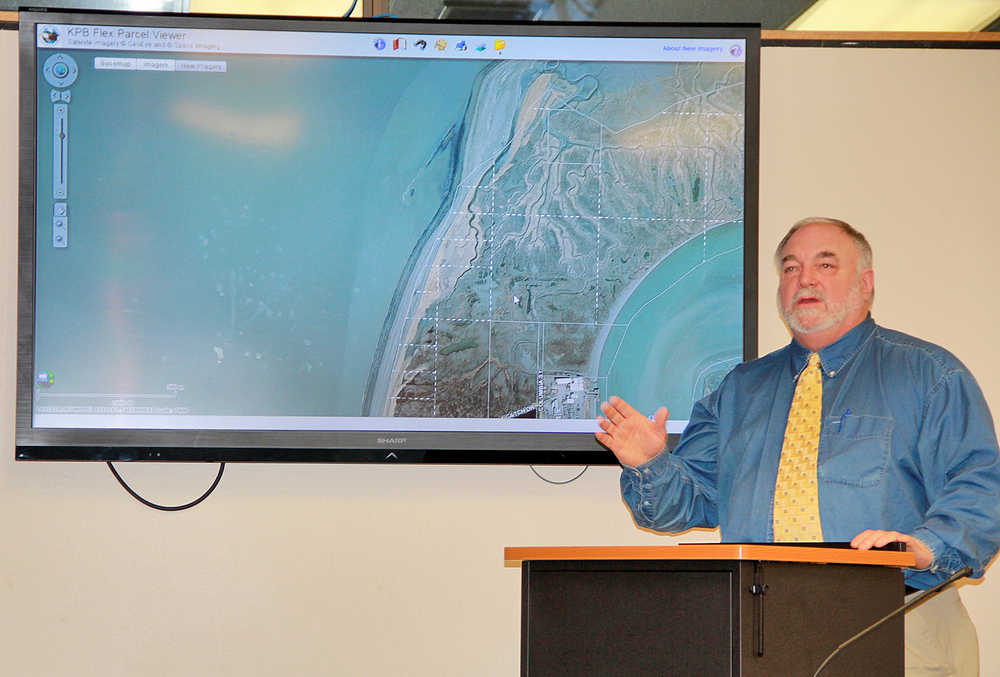The City of Kenai held their second work session on the dipnet fishery Tuesday night and 11 citizens shared their input as the city continues to troubleshoot ways to better manage the growing event.
Among the hot topics discussed was limiting motorized access to south beach, night closure for beach cleanup, clarification of parking and camping fees, riverbank erosion from boat wakes and the disruption of wetland vegetation from fishermen migration.
Two Kenai City Council members were present Tuesday, Robert Molloy and Brian Gabriel. Mayor Pat Porter, City Manager Rick Koch and city attorney Scott Bloom were present, along with several other department directors. Harbor Commissioners Tom Thompson, Bob Peters and Phillip Morin also participated in the work session.
Kenai resident Astrid Friend started off the public comments representing the South Beach Waterfront Landowners Coalition.
On behalf of south beach landowners she requested the City of Kenai restrict all motorized vehicles access to the south beach between Dunes Road and the mouth of the Kenai River. Having a direct public access and parking area off of the Inlet Salmon Road would mitigate the damage being inflicted, she said.
Ken Tarbox of Kenai addressed an issue raised by the Kenai Watershed Forum of how people migrate upstream to fish, which damages the marsh vegetation. He recommended the city close fishing in these areas for the entire month of July.
“As the dipnet population grows, you see the trend of people moving to fish in other areas,” he said. “It is damaging along the banks. You need to take care of it.”
Robert Ruffner, the Executive Director of the Kenai Watershed Forum brought up the same concerns about the vegetation around the river at the Feb. 19 Kenai City Council meeting. He said the impacts are coming from foot traffic off of Bridge Access Road, Boat Launch Road, Cannery Road and Sea Catch Drive and will be difficult to restore.
If fishing is legally open, but the beach is closed at night, the concern is heightened as people may walk upstream to fish, Ruffner said in an email to Koch for the work session.
Koch made his recommendations Tuesday to close the beach from 11 p.m. to 6 a.m. to allow the city time to properly clean up garbage, service toilets and rake the beach of fish waste. He said he is aware of the unintended consequences of people fishing elsewhere and would address the issue.
Koch said there was also significant confusion with dipnet participants not realizing parking fees did not including camping fees and shack attendants did not do an adequate job of explaining the fee structure. For this year Koch said he recommends a clarification to label day use parking for parking only for $20 and overnight parking to include camping for $55.
People accessing the beach to fish on ATV’s were also a problem last year because they did not pay fees but used city services, he said. A $20 fee for ATV parking is also being considered. A $10 drop-off fee would also reduce people who get a ride to the beach but do not pay for access, he said.
Kenai resident Dwight Kramer, chairman of the Kenai Area Fishermen Coalition, said he agreed with Koch’s approach to close the beach at night for safety reasons. Kramer attended the Board of Fish hearings and said they showed a lack of regard for the City of Kenai’s liability concern with the 24-hour dipnet fishery.
“It is going to take a death before anything changes,” he said. “It is time the city goes on its own authority for the protection and well-being of people. The city needs to put its foot down.”
Ricky Gease, the Executive Director for Kenai River Sportfishing Association, suggested the city provide satellite parking and shuttle people to the beach to alleviate traffic congestion. As far as generating more money from fees have people pay for a sockeye stamp, similar to what is done for kings.
Carolyn Snowden, who lives in the south beach area said while she agrees it’s everyone’s right to fish, she has seen too much of the negative aspects the dipnet fishery brings on the city.
“The fishery is running the City of Kenai,” she said. “It is time to stand up and run the fishery.”
Porter made a recommendation to eliminate parking, camping and campfires from the lower portion of south beach where landowners have made complaint of campers disrupting their homes during dipnet season.
“Every year this council and harbor commission does what they can to make it better for our residents,” Porter said.
Council members Molloy and Gabriel both said they appreciated the input from the community and were given a lot of good information to share with the rest of council as they discuss the upcoming season in later agendas. Molloy, the harbor commission liaison, said no actions could be taken during the work session.
Bob Peters, a Kenai harbor commissioner, said change takes time but thanked everyone for being part of the discussion because everyone is in it together.
“I have attended a lot of meetings in this room and seldom have I seen as many folks here,” he said. “There is hope and this is the way it gets changed.”

